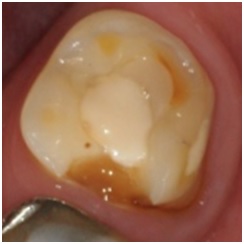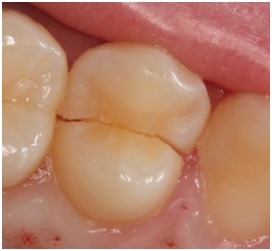Broken tooth/teeth may occur as a result of oral trauma, chewing food that is too hard, or by grinding your teeth (see bruxism). There is a higher risk when the tooth in question has had a large filing. Teeth with multiple fractures in them are at a higher risk of breaking, and will need full coverage crowns to protect them.
Q: How can a broken tooth be repaired?
A: When there is only a minor break, the treatment can be as simple as a white filling, or direct restoration. When a large break has occurred, however, a full coverage crown is needed to protect the remaining tooth structure.
Q: Are some breaks beyond repair?
Yes, sometimes the break can be so extensive, that the tooth cannot be fixed. In such cases, the tooth will need to be replaced with implants, partials, or bridges.
When you have a broken tooth, it is time to discuss options with your prosthodontist. They are the experts in assessing the extent of the damage and recommending the ideal treatment for your particular situation.

A previously restored tooth now with a broken ledge
Cracked teeth may develop over time or when you chew on hard foods (or ice), an accident which injured your mouth, or may occur from grinding your teeth (bruxism). A cracked tooth may cause sensitivity or pain when you bite on the injured portion of the tooth. Treatment will differ depending on the location and size of the cracked tooth.
Q: What can be done to repair a cracked tooth?
A: Your prosthodontist will often recommend a full coverage crown on the broken tooth. The crown will hold the tooth together, thus preventing the parts on either side of the crack from coming apart. However, if the crack goes into the nerve or root structure of the tooth it may or may not be savable.

A tooth that is cracked in the middle from side to side
Missing teeth can be due to gum disease, numerous cavities, and various injuries to the mouth. For people born without certain teeth, the condition is known as congenitally missing teeth. This is due to genetics, and can be seen over generations of a family. The most common missing teeth are second bicuspids, upper lateral incisors, and wisdom teeth. Inherited disorders and systemic conditions can also result in multiple missing teeth.
Q: Why do I have to replace missing teeth?
A: Replacing missing teeth helps to ensure proper speech and jaw support, helps with chewing of food, provides for a healthy smile, and promotes stability of the teeth nearby. The teeth adjacent to the missing tooth or teeth will tend to shift into the vacant space over time. Restoring missing teeth sooner rather than later will be easier, before surrounding teeth have shifted greatly.
Q: What options do I have to replace missing teeth?
A: Partial dentures, dental implants, and/or bridges are options to consider. Discuss treatments with your prosthodontist to help determine which option is best for you.
NOVA Premier Dental helps with this problem through offering our various Services.
Nova Premier Dental
313 Park Ave #306 Falls Church, VA 22046
(703) 532-7586
